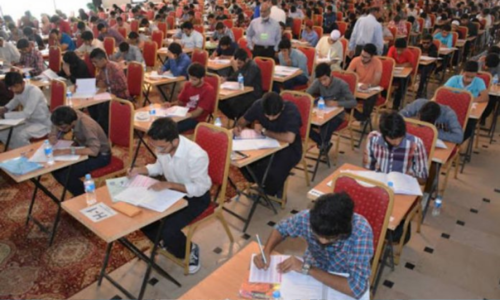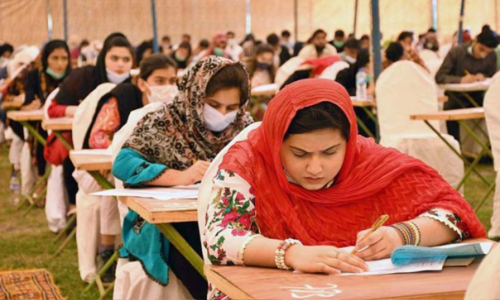• Commission withdraws incorrect results sent through e-mail
• 125,000 out of 194,133 candidates fail to qualify
ISLAMABAD: Confusion prevailed among around 200,000 candidates who appeared in the Medical and Dental Colleges Admission Test (MDCAT) after the Pakistan Medical Commission (PMC) announced on social media that the result cards that had been sent to them through e-mail should be ignored as they had a number of mistakes.
Later, it was announced that around 125,000 candidates — 65 per cent overall — had failed to get the passing marks [137/210].
The PMC also claimed that around 78pc candidates each from Sindh and Balochistan, 70pc candidates from Khyber Pakhtunkhwa, 65pc from Gilgit-Baltistan, 62pc from Azad Jammu and Kashmir, 57pc from Punjab and 54pc candidates from Islamabad failed to qualify the exam.
On the other hand, during a press conference on Saturday, the PMC management refused to reply to queries of mediapersons, terming them ‘planted questions’.
In response, the National Press Club demanded the government to take notice of the ‘dictatorial’ attitude of the PMC management.
Candidates of MDCAT – which is a mandatory test for getting admission to medical and dental colleges – on Saturday received result cards through e-mails sent by the PMC. However, a number of students were surprised to see that their marks had not been counted correctly.
According to some of the result cards, available with Dawn, students got 45 and even 51 marks out of a total of just 20 marks. Similarly, there was a difference of around 30 to 40 marks in the total. When the result cards were shared by the candidates on social media, the commission responded by saying that they should ignore the results.
“Please ignore any email received from a PMC address with an attached result certificate. The final MDCAT result will be announced online only,” the PMC tweeted.
Later during a press conference, held by PMC President Dr Arshad Taqi and Vice President Ali Raza, the results were announced.
It was informed that the post-exam analysis of MDCAT was carried out independently by Quaid-i-Azam University as per the request of Special Assistant to the Prime Minister (SAPM) on Health Dr Faisal Sultan.
The media was informed that a record number of 194,133 students took MDCAT from Aug 30 to Oct 2 out of whom 68,680 passed, with the national pass percentage of 35.4. Besides, 276 students, who had Covid-19 or dengue fever, took the exam on Saturday.
According to the breakdown, 42,860 students passed MDCAT in Punjab, with the pass percentage of 42.84, 7,797 students qualified in Sindh with a 22.37pc ratio, 12,205 students remained successful in Khyber Pakhtunkhwa with a 29.32pc passing ratio while in Balochistan 1,537 students cleared the exam, recording a pass percentage of 21.12.
Similarly, in Islamabad 2,139 students qualified MDCAT, with 46.26 pass percentage, 456 candidates passed in Gilgit-Baltistan with 35.21pc success ratio and 38.13pc (1,478) candidates remained successful in Azad Kashmir.
It may be mentioned here that MDCAT was held for the first time in 25 centres in Pakistan and six international centres in North America, Europe and the Middle East.
Speaking at the press conference, Dr Taqi said: “It is a proud day today for Pakistan Medical Commission as we announce the final result of the MDCAT 2021. However, the PMC believes in evolving according to international best practices and introducing reforms that will have a direct impact on improving the healthcare education and consequently the quality of healthcare delivery in Pakistan.”
He said he was indebted to the National Medical Authority for their hard work, the National Medical and Dental Board for developing the framework for the examination and syllabus of the MDCAT and the Medical and Dental Council for their guidance throughout the process.
“We are grateful for Quaid-i-Azam University’s support in conducting the independent post-exam analysis as per international standards that reiterates our commitment to transparency, meritocracy and competency,” Dr Taqi said. He also thanked SAPM on Health Dr Faisal Sultan, the ministries of health and foreign affairs, especially the diplomatic missions in Riyadh, London and Doha, for their support in ensuring successful conduct of MDCAT.
Sharing his thoughts, Ali Raza said the single computer-based national level MDCAT examination was a novel concept in Pakistan and criticised by certain circles, however, “we hope that the results will speak for themselves and will finally put to bed the doubts and fears created by a few detractors who seek to remain rooted in status quo”.
“It has ensured that the entrance exam for the most competitive higher education programme in the country carries the seal of integrity and students of genuine merit are able to compete for entry into medical and dental programmes,” Mr Raza said, adding that it had also allowed them to collect invaluable data of students that was not possible with a pen and paper examination. “This will allow us to examine and share with provincial education departments the strength and weaknesses of applicants down to a granular level as well as highlight the performance of schools across Pakistan where these children studied for their HSSC,” Ali Raza added.
He expressed the hope that this would enable them to make an informed intervention at the grass-root level thereby strengthening the education system.
While responding to the very first question after the press conference, Mr Raza said it was a planted question and all representatives of the PMC left the conference hall.
The question asked was who should be considered responsible when thousands of students were protesting against MDCAT, with a female candidate dying in Quetta during one such demonstration.
Meanwhile, the National Press Club has issued a condemnation, stating that the behaviour of the PMC management was dictatorial and urged the government to take notice.
Published in Dawn, October 10th, 2021













































